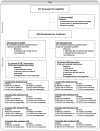Twelve-month follow-up of cognitive behavioral therapy for children with functional abdominal pain
- PMID: 23277304
- PMCID: PMC4167735
- DOI: 10.1001/2013.jamapediatrics.282
Twelve-month follow-up of cognitive behavioral therapy for children with functional abdominal pain
Abstract
Objective: To determine whether a brief intervention for children with functional abdominal pain and their parents' responses to their child's pain resulted in improved coping 12 months later.
Design: Prospective, randomized, longitudinal study.
Setting: Families were recruited during a 4-year period in Seattle, Washington, and Morristown, New Jersey.
Participants: Two hundred children with persistent functional abdominal pain and their parents.
Interventions: A 3-session social learning and cognitive behavioral therapy intervention or an education and support intervention.
Main outcome measures: Child symptoms and pain-coping responses were monitored using standard instruments, as was parental response to child pain behavior. Data were collected at baseline and after treatment (1 week and 3, 6, and 12 months after treatment). This article reports the 12-month data.
Results: Relative to children in the education and support group, children in the social learning and cognitive behavioral therapy group reported greater baseline to 12-month follow-up decreases in gastrointestinal symptom severity (estimated mean difference, -0.36; 95% CI, -0.63 to -0.01) and greater improvements in pain-coping responses (estimated mean difference, 0.61; 95% CI, 0.26 to 1.02). Relative to parents in the education and support group, parents in the social learning and cognitive behavioral therapy group reported greater baseline to 12-month decreases in solicitous responses to their child's symptoms (estimated mean difference, -0.22; 95% CI, -0.42 to -0.03) and greater decreases in maladaptive beliefs regarding their child's pain (estimated mean difference, -0.36; 95% CI, -0.59 to -0.13).
Conclusions: Results suggest long-term efficacy of a brief intervention to reduce parental solicitousness and increase coping skills. This strategy may be a viable alternative for children with functional abdominal pain.
Trial registration: clinicaltrials.gov Identifier: NCT00494260.
Summary for patients in
-
Functional abdominal pain in children and adolescents.JAMA Pediatr. 2013 Feb;167(2):204. doi: 10.1001/jamapediatrics.2013.1665. JAMA Pediatr. 2013. PMID: 23381459 No abstract available.
References
-
- McGrath PA. Pain in Children: Nature, Assessment, and Treatment. New York: Guilford; 1990.
-
- Schwille IJD, Giel KE, Zipfel S, Enck P, Ellert U. A community-based survey of abdominal pain prevalence, characteristics, and health care use among children. Clin Gastroenterol Hepatol. 2009;7(10):1062–1068. - PubMed
-
- Drossman DA. Rome III : The Functional Gastrointestinal Disorders. McLean, Va.: Degnon Associates; 2006.
-
- Campo JV, Bridge J, Lucas A, et al. Physical and emotional health of mothers of youth with functional abdominal pain. Arch Pediatr Adolesc Med. 2007;161(2):131–137. - PubMed
-
- Campo JV, Bridge J, Ehmann M, et al. Recurrent abdominal pain, anxiety, and depression in primary care. Pediatrics. 2004;113(4):817–824. - PubMed
Publication types
MeSH terms
Associated data
Grants and funding
LinkOut - more resources
Full Text Sources
Other Literature Sources
Medical


